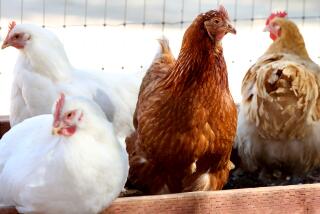Iraqis Cull Fowl After Possible New Bird Flu Cases
- Share via
BAGHDAD — Responding to fears of a second avian influenza outbreak this year, health officials in the southern Iraqi city of Amarah said Thursday that they had ordered hundreds of chickens slaughtered, cordoned off the town and begun disinfecting vehicles leaving the area.
A hospital official in Amarah said that although no human cases of the virus had been discovered, at least two chickens had tested positive. Samples from the birds were sent this week to Cairo for confirmation, still awaited Thursday by Iraqi officials.
“We have isolated the area and destroyed all the birds there in order to prevent the spread of the disease,” said Dr. Sabah Mahdi, a member of the Iraqi government’s bird flu task force.
“The Ministry of Health is fully prepared to deal with this problem, and we are doing our best to prevent any more cases from occurring, but migratory birds are still coming and obviously they don’t need passports to enter the country,” he said.
Migratory waterfowl are the most common carriers of avian flu. The ancient city of Amarah is near Iraq’s largest swamp and is known as a haven for birds.
The latest scare comes two weeks after the World Health Organization confirmed that the H5N1 strain of the virus was the cause of death for a 15-year-old girl in the Kurdish region of northern Iraq.
The girl had touched birds infected with the virus, Iraqi health officials said, and died in mid-January. Her uncle, who lived with the teen in a house where they kept their chickens during cold months, died 10 days later. Health officials believe that he too had the virus.
Fears of the virus have led many Iraqis to avoid eating poultry products, economically hurting the nation’s chicken farmers. On Wednesday, about 200 farmers gathered at the entrance of the Green Zone in Baghdad, where Iraq’s National Assembly meets, to demand compensation for their declining profits.
“We heard that the government had allocated huge sums of money to combat this disease, and we want the government to use some of this money to compensate us for having to get rid of all of our poultry,” said Hussein Ali Hamza, 44, owner of a poultry farm near Samawah, about 115 miles southwest of Amarah.
Avian flu generally infects birds and pigs, but in 1997, the first documented infection of humans killed six people in Hong Kong. When it was discovered that the virus had jumped from birds to humans, health authorities killed 1.5 million birds in an effort to avert a possible pandemic.
International health officials are deeply concerned about the virus’ potential for mutating into a form that could be transmitted by human-to-human contact. If caught in time, the disease -- which causes fever, sore throat, cough and, in fatal cases, viral pneumonia -- usually responds to antiviral drugs.
Iraqi hospitals have reported a rising number of patients checking in out of fear that they have contracted the virus. But so far, no human cases other than that of the Kurdish girl have been confirmed by international authorities.
At Baghdad’s Ghazil Market, the capital’s largest open-air poultry bazaar, bird shop owners recently sat drinking tea or cleaning bird cages. A few peacocks strutted through the garbage-strewn walkways.
Bird seller Mohan Jowda Ali, 56, said she had heard about the flu outbreaks but had nothing to fear.
“We have heard several rumors about this disease, but until now we haven’t had any of our chickens infected with it,” she said.
“I have been working in this field for about 45 years, and I like it a lot,” she said. “Iraqi chickens are very strong. They resist heat and sun. They will eat anything and not get sick; we also have good women who cook the chicken in a very nice way.”
*
Times staff writers Zainab Hussein, Shamil Aziz, Caesar Ahmed, Suhail Ahmad, Raheem Salman and Saif Rasheed contributed to this report.
More to Read
Sign up for Essential California
The most important California stories and recommendations in your inbox every morning.
You may occasionally receive promotional content from the Los Angeles Times.













